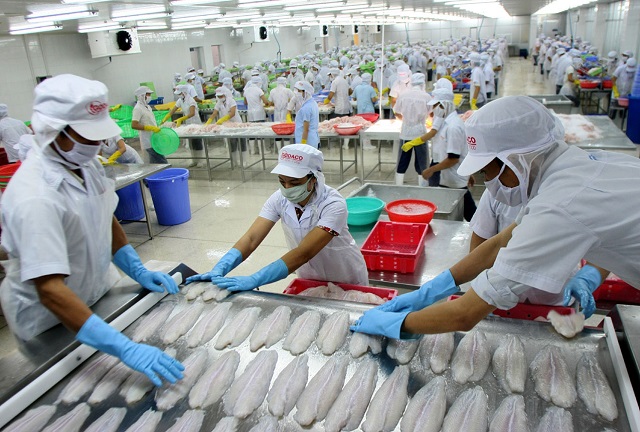EVFTA to further increase FDI to Vietnam in mid-and long-term
European investors have diversified investments in Vietnam to new fields, including telecommunications, finance, office leasing, retail, hi-tech farming, and pharmacy.
Foreign direct investment (FDI) inflows to high-quality projects are set to keep increasing to Vietnam in the mid-and long-term thanks to the EU-Vietnam Free Trade Agreement (EVFTA).
| Seafood processing at Godaco Company in Tien Giang Province. Photo: Viet Hung |
The assessment was given in a Government report on the trade and investment relations with the EU one year after the EVFTA kicked off.
As of September 2021, the EU has a total of 2,242 ongoing projects in Vietnam with registered capital of $22.24 billion, up 164 projects, and $483 million in the capital against the same period of last year.
Such figures accounted for 5.58% of total investment capital and 6.57% of foreign-invested projects in Vietnam, noted the report, adding a number of successful European corporations in Vietnam include Shell Group (Netherlands), Total Elf Fina (France-Belgium), Daimler Chrysler (Germany), Siemen, Alcatel Comvik (Sweden).
According to the report, EU investors are mainly focusing on high-tech projects, however, there has been a growing trend of investment into the services sectors such as telecommunications, finance, office leasing, retail, renewables, supporting industries, food processing, hi-tech farming, and pharmacy.
Meanwhile, trade relations between Vietnam and the EU have remained on an upward trend despite the severe Covid-19 impacts on global supply chains.
For the first nine months of 2021, Vietnam exported goods worth US$28.8 billion to the EU, or an increase of 11.6% year-on-year, marking the bloc’s Vietnam’s third-largest export market.
In return, Vietnam’s imports from the EU sharply rose by 19% to $12.6 billion during the period.
The Government, however, noted a low rate of Vietnam’s key export commodities shipped to the EU with C/O (certificate of origin), such as garment, coffee, or steel products (15.7% for garment, 9% for coffee and steel), which require greater efforts from local enterprises to comply with Vietnam’s commitments in the EVFTA.
To date, 38 out of 63 provinces/cities in Vietnam have engaged in trading activities with EU country members, while the others remain focused on traditional markets, for which the Government stressed the necessity of greater efforts in market diversification.
The EVFTA was signed between Vietnam and the EU on June 30, 2019. After both sides ratified the deal, it became effective on August 1, 2020.












